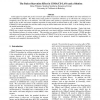Free Online Productivity Tools
i2Speak
i2Symbol
i2OCR
iTex2Img
iWeb2Print
iWeb2Shot
i2Type
iPdf2Split
iPdf2Merge
i2Bopomofo
i2Arabic
i2Style
i2Image
i2PDF
iLatex2Rtf
Sci2ools
LCN
1994
IEEE
1994
IEEE
The Packet Starvation Effect in CSMA/CD LANs and a Solution
In this paper we explore the packet starvation effect (PSE) that occurs in Ethernet controllers due to the unfairness of the CSMA/CD algorithm. The PSE causes some packets to experience latencies up to 100 times the average or to completely starve out due to 16 collisions. The PSE causes some packets to experience high delays at realistic offered loads as low as 40% and causes complete starvation of some packets at offered loads as low as 60%. The PSE makes CSMA/CD LANs unsuitable for real-time traffic except at offered loads much less than 100%. It is the limiting factor in the usable bandwidth of the bus. As an alternative to CSMA/CD, we present the Fair Dual Distributed Queue (FDDQ) algorithm. Under high load, FDDQ uses a single reservation mini-slot per packet and a tree-based collision resolution algorithm (CRA) to maintain two distributed queues of waiting senders. This provides two priority FCFS access to the network. FDDQ provides utilizations and average latencies very simila...
Computer Networks | LCN 1994 | Packet Starvation Effect | Pse Makes Csma/cd | Realistic Offered Loads |
Related Content
| Added | 09 Aug 2010 |
| Updated | 09 Aug 2010 |
| Type | Conference |
| Year | 1994 |
| Where | LCN |
| Authors | Brian Whetten, Stephen Steinberg, Domenico Ferrari |
Comments (0)

